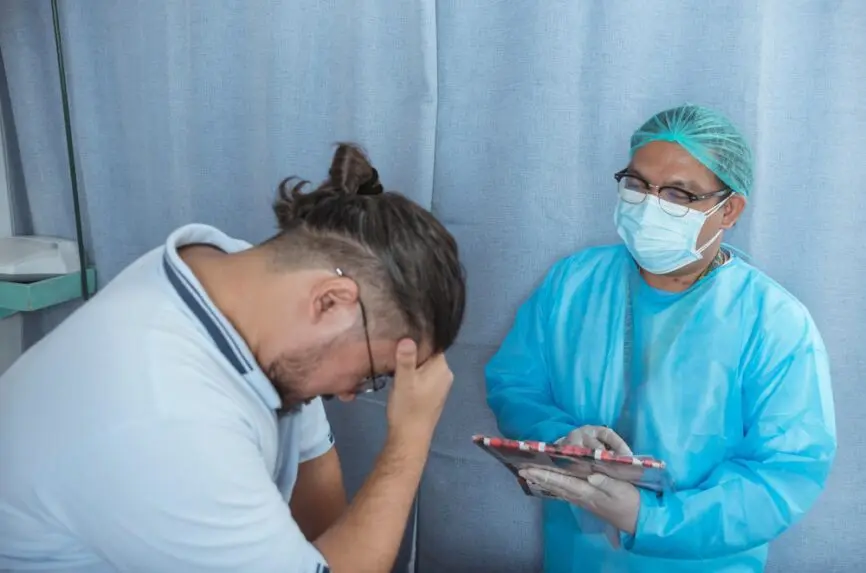Bioethics Forum Essay
Bioethicists and Health Care Institutions Must Act Against Florida’s Anti-Immigrant Law
It is the recurring nightmare of bioethicists and all who are concerned with the humaneness of the healing professions that we might unwittingly sleep through subtle changes that erode the mission of our health care institutions. As a result, many people in bioethics and health care are sounding the alarms about artificial intelligence and how it might incorporate algorithms that increase health inequities. One simply wouldn’t want to sleep through such impactful changes and let them become the new normal.
But Florida’s new anti-immigrant law, SB 1718, has escaped widespread notice, despite the way it will undermine the mission—and core identity–of not-for-profit hospitals as caring institutions that promote the health of the community. SB 1718, which will take effect on July 1, is best known for its provisions regarding driver’s licenses and employment. However, it also requires a hospital that accepts Medicaid to “include a provision on its patient admission or registration forms for the patient or the patient’s representative to state or indicate whether the patient is a United States citizen or lawfully present in the United States or is not lawfully present in the United States.” (Section 395.3027; 255-260).
To try to defuse resistance to this measure, the law adds, “The inquiry must be followed by a statement that the response will not affect patient care or result in a report of the patient’s immigration status to immigration authorities” (Section 395.3027; 260 -262). In short, SB 1718 enlists hospitals in discouraging undocumented immigrants from seeking care. It effectively deputizes hospitals as a new and toxic branch of social control and law enforcement. This is an unprecedented role for nonprofit health care, and the lack of resistance to accepting the role is unprecedented, as well.
Hospitals and health systems have had to consider how to fulfill their patient care obligations in the increasingly anti-immigrant environment that has evolved in the U.S. over the past 40 years. Because undocumented immigrants are ineligible for all federal benefits, such as Medicare and Medicaid, this population has a high rate of uninsurance. Not-for-profit health care systems have had to consider how to treat these patients in a way that is consistent with their long-established values as caring institutions that efficiently deliver care and promote the health of the public. As a result, hospitals have had to find innovative ways to use charity care resources and partnerships with providers, such as federally qualified health centers, to encourage patients to seek care when appropriate and discharge them in ways that are supportive rather than fear-producing.
This sense of goodwill and trust between hospitals and this population enables care to be provided before a patient’s illness has progressed. Moreover, as the COVID-19 pandemic demonstrated, it is also vital to the health of the community that patients trust information from their health care providers and that they seek preventive care and follow preventive measures. The connectedness of all of our health statuses was so apparent early in the pandemic that it briefly promised to transform our thinking. It became clear that our health statuses are far more connected than our citizenship statuses.
Any measure that risks driving patients away from needed care is a risk to public health and undermines community trust. It takes the failure to address immigration challenges adequately and then injects that failure into the clinician-patient relationship.
Moreover, the notion that undocumented residents pose an unacceptable burden to our health care systems reflects a policy failure that turfs responsibility to individual health care institutions. If such residents are frightened to go to the hospital for, say, dialysis, then the institutions will often later have to eat the charges for treating their emergency hyperkalemia. And in Florida’s largest community, Miami-Dade County, all residents, documented or not, pay sales tax that supports the county’s Public Health Trust, a safety-net system of four hospitals and other facilities that has long provided excellent care for all patients, without any litmus test to assess their worthiness.
Nonprofit hospitals and health systems have lived and advocated for these values regarding undocumented patients for several decades in fairly public ways. For instance, hospitals successfully advocated to be designated as sensitive locations exempt from routine immigration enforcement actions during the Obama administration. When patients’ fears increased during the Trump administration, many health systems in areas with significant immigrant populations adopted institutional policies and actions designed to mitigate the risks and reassure their patients. It is strange and disheartening that so little should be said when Florida, a large state with a significant immigrant population, requires its hospitals to participate in an action that is clearly designed to create fear among immigrant patients and their families and potentially prevent them from seeking needed care in a timely fashion. Perhaps even worse, it risks recasting the identity of hospitals from caring institutions to places to be feare in the minds of immigrants. As we know from other health care atrocities, such a legacy can have a negative impact long into the future.
So, what should we do? While there is no definitive list of actions to be taken, some things seem clear, and others are worth considering.
First, every health care and bioethics professional society and major membership organization should issue a statement that this data collection requirement goes against the core values and established practices of its professions and institutions. Bioethicists should lead the way through our own professional organizations, such as the Association of Bioethics Program Directors, and by leveraging our relationships with medical and health care organizations to encourage them to issue public statements that make clear the professionally damaging nature of this law and advocate for its repeal.
Second, hospitals and health systems in Florida should develop strategies to minimize the impact of this requirement. This will require courage, as the state has sought to intimidate them by tying this requirement to their Medicaid funding. Nevertheless, appropriate responses might include strong actions, such as hospitals and health systems banding together to resist implementation through defiance. For example, they might agree not to include the citizenship status question in the registration process. Less dramatically, hospitals might comply with the law and include the citizenship question, but recommend that patients exercise their option to decline to answer it. Indeed, the bravest institutions will signal that option at every opportunity.
To be clear, there is no playbook that guarantees success when the identity of organizations and professions is threatened by extremist politics. However, to acquiesce silently to such threats means that their identity has already been corrupted.
Mark G. Kuczewski, PhD, HEC-C, is the Michael I. English, S.J. Professor of Medical Ethics and director of the Neiswanger Institute for Bioethics at the Stritch School of Medicine, Loyola University Chicago. He is a Hastings Center fellow.
Kenneth W. Goodman, PhD, FACMI, FACE, is Professor of Medicine and founder and director of the University of Miami Miller School of Medicine’s Institute for Bioethics and Health Policy and director of the university’s Ethics Programs. He is a Hastings Center fellow.














Thank you for this much needed commentary, set of practical recommendations, and call to action. A decade ago, at a different political and media moment, the consequences of state-level anti-immigrant laws in Arizona, Alabama, and other states attracted considerable attention in the bioethics community and related disciplines and professions. As you note, SB1718 has attracted much less attention, perhaps due to the numbing effects of anti-immigrant speech and action, or bad-faith arguments about who “deserves” health care. However, there is no ambiguity here about whether this issue is in “our” lane; SB1718 is a clear threat to patient care, professional duty, organizational responsibilities to the communities they serve, and any concept of health equity.
Thank you for this post. It’s a timely rejoinder to claim our responsibility to provide health care for the good of our society. The use of hospitals to become immigration surveillance agents is deplorable. What seems worse, to me, is the unwillingness of ostensibly faith-based institutions to openly respond to these encroachments on their “mission”.
Thank you very much for your reflections. Indeed, it will be necessary to say “enough” to many political proclamations contrary to the most basic human rights.
Not to mention how utterly hypocritical it seems to deny rights here (the West) through exclusion, and violate them there (the global South) through unfair (and often illegitimate) trade in raw materials so necessary for our “development”…
Humanize!?
I appreciated this post. Unfortunately in Europe we are used to attempts to criminalize undocumented migrants sometimes seeking “support” from healthcare professionals. In 2009, Italian government approved a decree that prescribed healthcare professionals to report undocumented migrants they encountered because of care reasons. Not only there were protests and several “I do not report” campaigns have been launched, but the community of healthcare professionals unitedly said NO and refused to follow that obligation. A similar thing happened in 2012 in Spain after the withdrawal of hundreds thousands healthcare cards that allowed undocumented migrants to access care service. Those were good examples of what I refer to as “bioethics in action”. I do agree with the point made in the post that too much often bioethics is concerned about technological developments and cutting edge discoveries, but we cannot disregard to commit on issues that affect fundamental rights of large population groups, like this law approval is. I have been happy to see many US and Canadian bioethics institutions releasing statements after George Floyd’s death on the entrenchment between covid, violence and racism, but I think bioethics community must put more efforts and engage in this battle with all their strength.
Wow, this article highlights a serious concern about how Florida’s new law could undermine the core mission of healthcare institutions. As an immigration lawyer, I can see how this creates a chilling effect on immigrant communities, potentially deterring them from seeking essential medical care due to fear of their status being scrutinized. Hospitals have always been places of refuge and care, and this law seems to turn them into instruments of immigration enforcement. It’s crucial for both bioethicists and healthcare professionals to stand up against this erosion of trust and advocate for changes that align with their foundational values of providing care without prejudice. What are your thoughts on how we can support these institutions in resisting such policies?